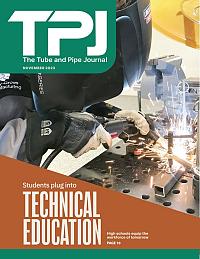Editor
- FMA
- The Fabricator
- FABTECH
- Canadian Metalworking
Categories
- Additive Manufacturing
- Aluminum Welding
- Arc Welding
- Assembly and Joining
- Automation and Robotics
- Bending and Forming
- Consumables
- Cutting and Weld Prep
- Electric Vehicles
- En Español
- Finishing
- Hydroforming
- Laser Cutting
- Laser Welding
- Machining
- Manufacturing Software
- Materials Handling
- Metals/Materials
- Oxyfuel Cutting
- Plasma Cutting
- Power Tools
- Punching and Other Holemaking
- Roll Forming
- Safety
- Sawing
- Shearing
- Shop Management
- Testing and Measuring
- Tube and Pipe Fabrication
- Tube and Pipe Production
- Waterjet Cutting
Industry Directory
Webcasts
Podcasts
FAB 40
Advertise
Subscribe
Account Login
Search
High schools equip tomorrow’s fabrication, welding workforce
How students in the Midwest are plugging into technical skilled trades education
- By Lincoln Brunner
- October 26, 2023
- Article
- Arc Welding
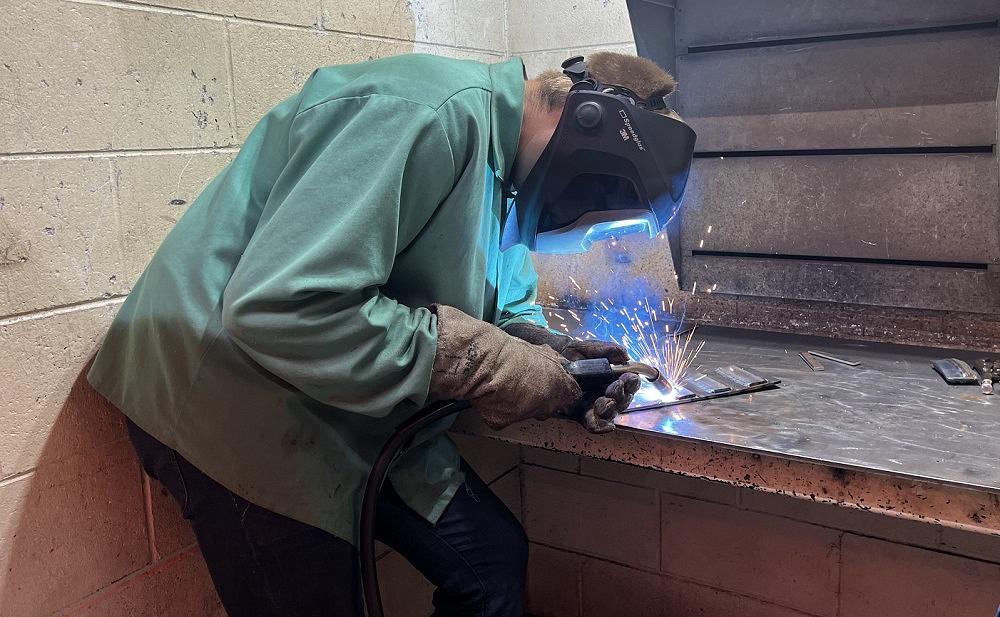
Hartford Union High School student Andrew Steger lays down a bead in one of the school’s 20 welding bays, part of a huge technical education wing constructed with a community-wide referendum in 2000.
If you want a concise picture of manufacturing’s future, just hang around the technical education wing of Hartford Union High School in Wisconsin for a couple of hours.
No, you won’t see a lot of robotic equipment (a little, yes) or any cleanrooms. But what you will see is a bunch of students learning how to design and fabricate metal parts—skills that more than a few of them plan to use after they graduate.
Community Connections
Today, 15 guys, mostly juniors and seniors, fidget and crack jokes before their Welding III class—that is, until teacher Corey McCauley walks into the classroom. McCauley, the veteran of the department, is also the high school’s head wrestling coach and looks the part. With the calm but authoritative tone of someone used to dealing with high school boys, McCauley runs through a few rules and announcements before he sends the guys out for the real fun—welding in the school’s top-of-the-line shop, which boasts 20 welding bays, each with its own modern power source. That’s in addition to the press brake, flat laser cutting machine, and robotic welding machine the school has—all donated or funded by the local businesses that benefit from the talent the school cranks out year after year from a program that typically has 300 students among a high school of less than 1,400.
McCauley doesn’t even try to hide how proud he is of the program, especially considering what it was when he arrived 30 years ago. “When I came, our machine shop had very World War II-ish equipment,” McCauley joked. “We didn’t have any fabrication equipment at all. Now it’s completely CNC type of stuff.”
When McCauley showed up, he did more than make connections with those businesses, though. When summer came, he went to work for a couple of those area businesses, just to see firsthand what they did and what they needed.
“Our real goal is to get these kids to our local companies and bolster them,” McCauley said. “These companies support us hugely. They give us money for equipment. They give us used equipment, and they donate many tons of metal to us. What’s cool is, that is exactly the material that [the students] would work with once they go to the job. So, they get used to the parameters and settings and how it works.”
Two hours south of Hartford, that kind of community business connection keeps the industrial technology department at Cary-Grove High School in Illinois running and growing. The school’s industrial tech program is 13 years old, but it didn’t really begin revamping its metalworking program until eight or nine years ago, said industrial tech teacher Chris West. Today, the program has 60 to 70 students total and continues to grow.
“At the [beginning], we had one mill and one lathe, and no one knew how to use them, and they were kind of rusting in the corner,” West recalled with a laugh. “So, it was either put them to use or give the real estate back. And after talking to a couple people in town, hearing how they were desperate for workers, we made the call to put them to use. That was kind of the start of the ball rolling. COVID kind of slowed us down on the program growth, but now we’re starting to pick up steam again.”
Mike Manning, Industrial and Careers/Wellness Division leader at Cary-Grove, mentioned several nearby businesses that have helped the program, including Swiss Automation, XACT Wire EDM, Scott Forge, Fabrik Molded Plastics, and Chicago Plastic Systems. Connecting with those businesses and the Technology and Manufacturing Association has proven invaluable as the program continues to grow for students like Zach Stolz, who graduated from Cary-Grove High School in 2021 and now works as a CNC lathe operator for Swiss Automation, based in Barrington, Ill.
Fostering Interest, Developing Skills
Stolz credited the Cary-Grove program for helping him nurture a lifelong interest in working with his hands into full-time employment, starting with an industrial technology orientation class he took freshman year, 2017.
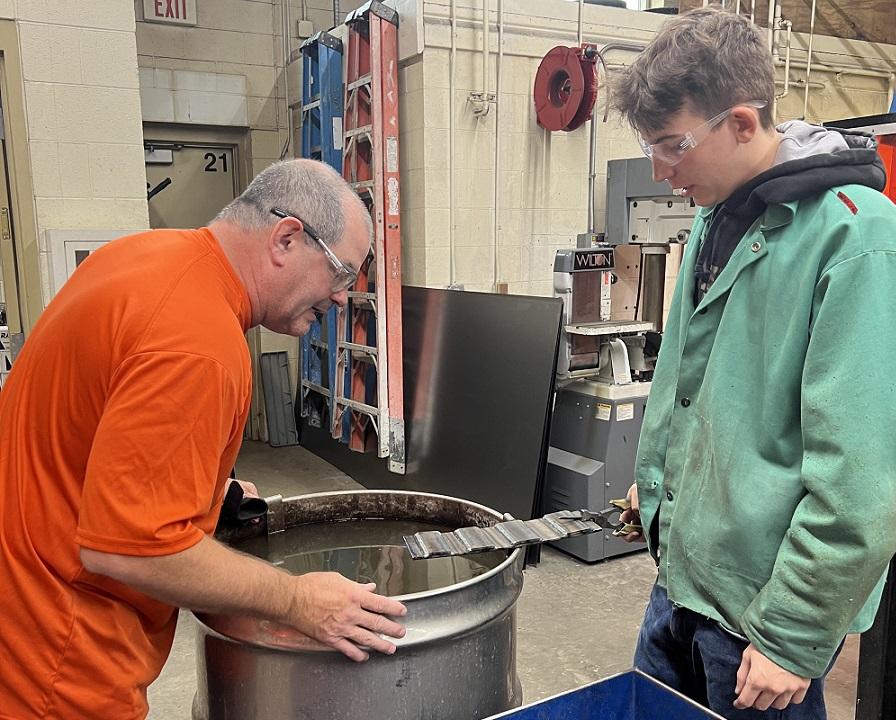
Hartford Union High School teacher Corey McCauley talks over some lap welds with senior Tyler Moore in the school’s welding lab. Images: Lincoln Brunner
“It covered a bunch of different [topics] like woods and metals,” Stolz said. “I started there and then took a couple more woods classes, a couple more metals classes, and then kind of worked into the CNC stuff.
“The metals class has always interested me the most, especially because we got to work in not just machining, but also working on welding and different other aspects. It was always kept fun and interesting to me. It’s not just a normal kind of school class.”
That’s pretty much a textbook outcome for the program, according to West.
“Once they have interest, it’s usually just trying to keep them involved and providing different opportunities so that not only can they see the initial aspect of the curriculum or the project at hand, but then also how that can be applied to other projects,” West said. “That usually helps create and maintain that interest and excitement towards it and then hopefully leads them towards a path that is a career, something they could do with their lives.”
Stolz says that problem-solving and other skills he learned as a high school student helped him once he hit the shop floor as a full-time employee.
“Learning different measurement techniques and stuff like that when I first started, it was definitely a nice step where I felt a lot more comfortable there [at work] than I thought I would be,” Stolz said.
Up in Hartford, the tech ed program has helped students like Tyler Moore, a senior who is part of the school’s youth apprenticeship program, a cooperative arrangement that Hartford Union High School has with local businesses like Moore’s employer, Triton Trailers. Students in the program earn class credit at school and money at work, and the school flexes the students’ academic schedules around work hours.
The program has proven almost ideal for Moore. After a rough freshman year, he’s now catching up on credits while doing tasks like TIG welding on aluminum pieces and assembly at Triton Trailer.
“That’s not what I want to do when I’m older, but I’m doing it for the experience,” said Moore, who aspires to be a union operator of heavy equipment like excavators and road graders. “It’s been really good.
“I definitely want to get into some highway work. I’ve always found it cool to be in an excavator, digging. My dad’s been in in concrete for years, so I really had the construction background my whole life. I’ve always had the opportunity to run equipment, and I’ve loved it. It’s a little harder on you, but I think that working harder is better.”
Giving students skills they can take anywhere is what the program is all about, McCauley said.
“I always tell the kids, ‘No matter what you do in life, welding is something you can do anywhere in the world—anywhere in the world,” McCauley said. “I don’t care where you end up. Machines might have a different language on them, but you know how they operate. A press brake is the same way; a laser, the same way. It’s a tool in their tool belt that they’ll never lose. They will always have it. They always have a backup plan; it’s built-in now.”
About the Author

Lincoln Brunner
2135 Point Blvd.
Elgin, IL 60123
(815)-227-8243
Lincoln Brunner is editor of The Tube & Pipe Journal. This is his second stint at TPJ, where he served as an editor for two years before helping launch thefabricator.com as FMA's first web content manager. After that very rewarding experience, he worked for 17 years as an international journalist and communications director in the nonprofit sector. He is a published author and has written extensively about all facets of the metal fabrication industry.
About the Publication
subscribe now
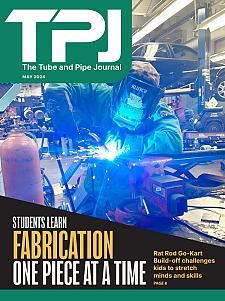
The Tube and Pipe Journal became the first magazine dedicated to serving the metal tube and pipe industry in 1990. Today, it remains the only North American publication devoted to this industry, and it has become the most trusted source of information for tube and pipe professionals.
start your free subscription- Stay connected from anywhere

Easily access valuable industry resources now with full access to the digital edition of The Fabricator.

Easily access valuable industry resources now with full access to the digital edition of The Welder.

Easily access valuable industry resources now with full access to the digital edition of The Tube and Pipe Journal.
- Podcasting
- Podcast:
- The Fabricator Podcast
- Published:
- 04/16/2024
- Running Time:
- 63:29
In this episode of The Fabricator Podcast, Caleb Chamberlain, co-founder and CEO of OSH Cut, discusses his company’s...
- Trending Articles
Zekelman Industries to invest $120 million in Arkansas expansion
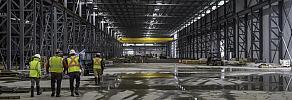
3D laser tube cutting system available in 3, 4, or 5 kW
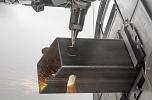
Corrosion-inhibiting coating can be peeled off after use

Brushless copper tubing cutter adjusts to ODs up to 2-1/8 in.
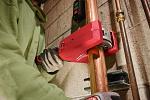
HGG Profiling Equipment names area sales manager

- Industry Events
16th Annual Safety Conference
- April 30 - May 1, 2024
- Elgin,
Pipe and Tube Conference
- May 21 - 22, 2024
- Omaha, NE
World-Class Roll Forming Workshop
- June 5 - 6, 2024
- Louisville, KY
Advanced Laser Application Workshop
- June 25 - 27, 2024
- Novi, MI
























